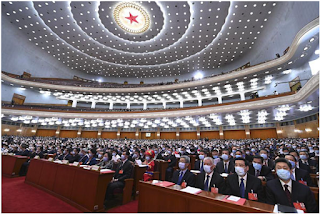With the Vanguard at the center of the nation's life, it ought not to be expected that alternative centers of mass mobilization would continue draw attention. That attention is focused on an increasingly tight supervision of religious activity, and an increasing sensitivity to the use of religion and religious institutions to project messages, sentiments or practices that challenge or at least diverge from the official line of the state authorities under the leadership of the Communist Party of China. That oversight now extends to emerging tech based media., and to the use of tech based media by religious individuals or organizaitons
Chinese President Xi Jinping has flagged a further tightening of control on religion, in a speech at a national religious work conference held in Beijing late last week. Xi said China would further promote “sinicisation of religion”, with a focus on strengthening control of online religious affairs. He emphasised that religious activities must be conducted within the boundary of the law, according to official Xinhua news agency. “Religious activities should be carried out within the scope stipulated by laws and regulations … and should not interfere with educational, judicial and administrative affairs as well as social life,” Xi said. (China tightens control of religion, with focus on national security)
This move aligns with policy initiatives in other areas that seek to put the CPC in the center and to ensure that deviation from the ideological baseline of state and Party are more effectively policed. That applies with some force recent to the efforts to tighten control of celebrity culture, and now with the more comprehensive management of religious activity online.
During the conference in Beijing on Dec. 3-4, Xi emphasized the importance of “upholding the principle of developing religions in the Chinese context and providing active guidance for the adaptation of religions to socialist society,” according to a statement from the CCP. Xi said China would further promote the Sinicization of religion, with a focus on strengthening control of online religious affairs, and insisted that all religious activities must be conducted within the boundary of the law, reports Xinhua news agency. . . He called for more surveillance and for punishing believers who use social networks for religious proselytization or criticism of the government’s religious policy. (China stresses more Marxism, tightening control of religion).
It was also reported that "Xi urged more nationalism, collectivism, socialism, and an improved understanding of history in the religious sector. He also emphasized the importance of the overall national security" (Xi Stresses Sinicization and Regulation of Religious Activities). This policy initiative has now been solidified in the form of 《互联网宗教信息服务管理办法 》("Administrative Measures for Internet Religious Information Services") circulated by 中央统战部网站 (Central United Front Work Department) website. The CUFWD release described the new measures this way:
The "Measures" insist on the unity of safeguarding citizens’ freedom of
religious belief and safeguarding national ideological security,
maintaining the unity of safeguarding the legitimate rights and
interests of religious citizens and practicing the core values of
socialism, uniting the standardization of Internet religious information
services and promoting the healthy inheritance of religions, and
upholding rights Integrate with obligations and embody the principles of
protecting legality, curbing illegality, curbing extremism, resisting
infiltration, and fighting crime. (《互联网宗教信息服务管理办法》公布)
The system is permit oriented.
The measures stipulated that online preaching should be organized and carried out by religious groups, temples and churches and religious colleges that have obtained the Internet Religious Information Service Permit. With the Permit, they could preach religious doctrines online that are conducive to social harmony and civilization, and guide religious people to be patriotic to the country and abide by the law, only via their own specialized internet websites, applications or forums that are approved by law. Participants shall register using their real names. With the Permit, religious colleges are able to train their students and religious people on their specialized internet websites, applications or forums approved according to law. Their specialized internet sites, applications and forums must use a virtual specialized network to connect to the outside world, and verify the identity of personnel participating in the training, the measures said. (Overseas organizations, individuals not allowed to operate online religious info services within the Chinese territory: regulations).
The Measures make it clear that foreign organizations and individuals would find it vcirtually impossible to project their missions into China. Of particular interest is Article 27:
Article 27: National security agencies shall guard against and deal with
foreign institutions, organizations, and individuals in accordance with
the law, as well as domestic institutions, organizations, and
individuals colluding with foreign institutions, organizations, and
individuals to use religion to conduct activities that endanger national
security on the Internet. [第二十七条 国家安全机关应当依法防范和处置境外机构、组织、个人,以及境内机构、组织、个人与境外机构、组织、个人相勾结在互联网上利用宗教进行的危害国家安全活动。]

This provision appears to extend a substantial scope of discretionary authority in officials to harden barriers between domestic religious collectives and their connection with the rest of the communities of the faithful elsewhere. It is meant, it appears to detach Chinese communities of believers from the rest of belief communities elsewhere, It substitutes national solidarity within territorial borders for religious solitary across borders. In these respects it expands and refines current policies rather than creates new ones. The operative policy here is supervision and approval. The policy goal is convergence of religious and political lines and the constitution of dependent national religious communities.Religious practice, and the expression of religion, is permitted, as long as both individual and expression are approved by the state and are compatible with state policy. Religious practice and expression that is incompatible with state ideology and policy may be managed or suppressed, and those engaging in such practices punished.
These measures are not new to Chinese tradition, though their current expression is more advanced. As that policy trajectory evolves, however, it more and more directly comes into conflict with the trajectories of religious freedom development in liberal democratic states, and the ancient traditions of transnational religious communities--not just the Abrahamic faiths, but others as well. "Last month, China was among several nations designated by the US as “countries of particular concern” for violations of religious freedom." (China to promote 'sinicization of religion', says Xi Jinping: He said that religious groups should stand as a bridge and a bond connecting the party and the government with people).
The Measures also suggest the growing space between the core principles and sensibilities that drive the dialogue around the legal relationship between public authorities and religious communities outside of China, and Chinese approaches to the relationship of state and religion. Outside of China remains grounded in individual rights and autonomy, but rights also collectivized within the religious communities in which individuals express belief through ritual performance. There is also a wide area of space available (at least in liberal democratic orders, mirrored in the jurisprudence of regional human rights authorities) of an expressive space for religious belief that may acquire a political dimension int he form of challenges to state policies. That is highly contested, of course, especially in traditional societies where laws against apostasy and insults to religion have substantial regulatory effect and tend to marginalize the voices of religious minorities--assuming they are tolerated at all. But it is also contested, at least at its borders in states that embrace policies of laïcité. The dialogue about religion and its exercise are now more clearly built on quite different core principles in China and elsewhere. And like so many other areas that were once at the core of global principles of convergence, religion and religious communities are now part of the movement advancing principles of national detachment and management.
As one considers the emerging Chinese position, it might be useful to have in mind another Asian state in another time, a historical moment exquisitely rendered by Martin Scorsese in
Silence (2016). There is a scene between the missionary priest (Rodrigues), now captured, and the Japanese the Governor of Chikugo and Inquisitor (Inoue) enforcing a national regime in which foreign religions (variations of Christianity) have been suppressed. The scene suggests not a clash of regimes but a clash of fundamental ways of understanding the world ought to be ordered--along with the tragedies that result when two ways of looking at the world, fundamentally incompatible, meet as one projects itself into the other.
INOUE: (laughs lightly) Don't you think it would be better for the man to forget about foreign women and choose one of his own?
RODRIGUES: Nationality is not so important in a marriage. What matters is love and fidelity.
INOUE: Love? Padre, there are men who are plagued by the persistent love of an ugly woman.
RODRIGUES: That’s what you think missionary work is?
INOUE: Well, from my point of view...our point of view...yes. What is the word for a woman who cannot bear children? INTERPRETER: Barren.
INOUE: A barren woman cannot be a true wife.
RODRIGUES: If the Gospel has lost its way here, it’s not the fault of the church. It’s the fault of those who tear the faithful from their faith like a husband from a wife.
INOUE: (Quietly) You mean me. . . Padre, you missionaries do not seem to know Japan.
RODRIGUES: And you, honorable Inquisitor, do not seem to know Christianity.
Silence. They have checkmated one another. For the moment.
INOUE: Padre, there are those...there are many...who think of your religion as a curse. I do not. I see it in another way. But still dangerous. (he rises) I’d like you to think about the persistent love of an ugly woman. And about how a barren woman should never be a wife. (Silence (2016), Script pp. 85-86).
Globalization and the fundamental premise of convergence, of toleration and unity in diversity, was meant ot make this sort of clash obsolete, or at least benign. But that moment seems to have passed. And place of a fundamental commitment to convergence, we appear to find ourselves in a global order that ir ordered on a core principle of decoupling, and no more so in the realm of religion. This is not a uniquely "Chinese" problem, but one that appears now in different parts of the world but in different forms, each in their own way undermining that effort to naturalize a way of looking at the relationship between the state and religion that finds its home most comfortably in liberal democratic states and in the documentary discourse of international instruments first empowered in the shadow of the Jewish European Holocaust.
The full text of 《互联网宗教信息服务管理办法 》("Administrative Measures for Internet Religious Information Services") circulated by 中央统战部网站 (Central United Front Work Department) website appears below in the original Chinese and in a crude English translation.






















